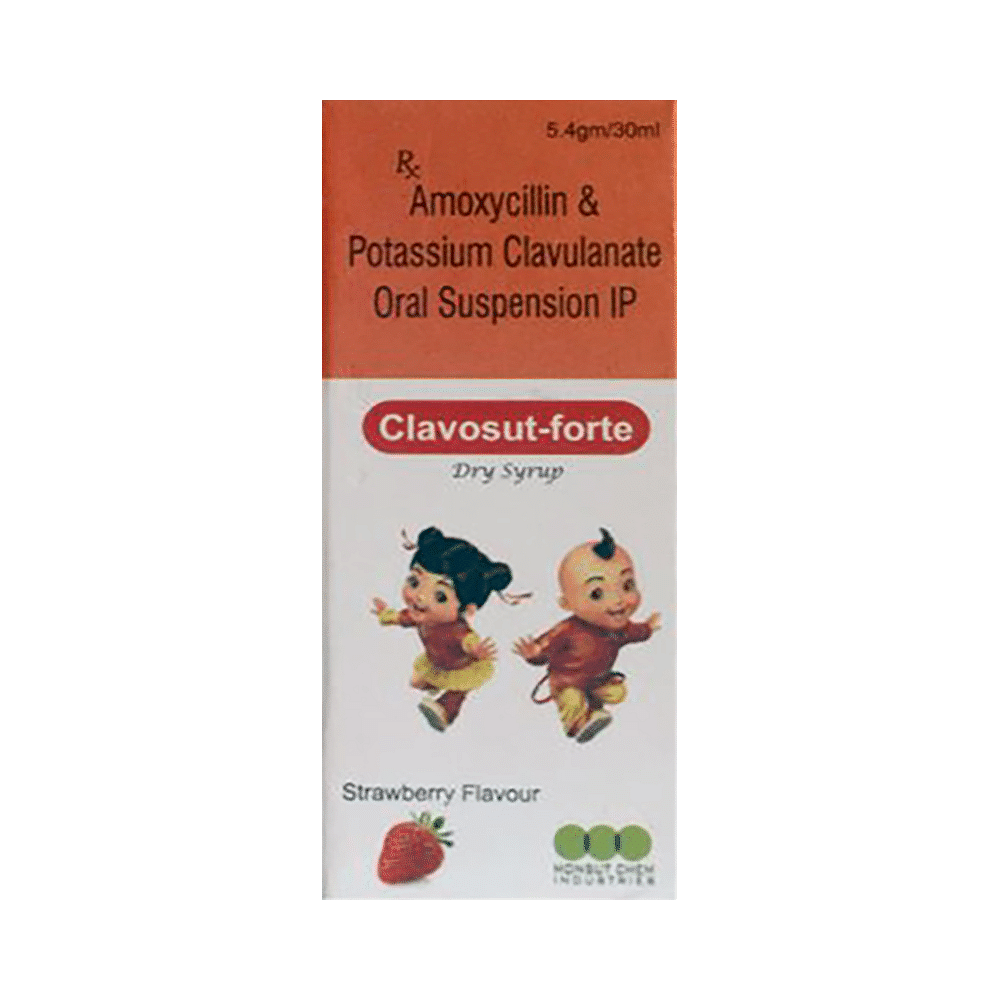
Amocare-CV Duo Dry Syrup
Manufacturer
H & Care Incorp
Salt Composition
Amoxycillin (400mg) + Clavulanic Acid (57mg)
Key Information
Short Description
Amocare-CV Duo Dry Syrup is an antibiotic medicine that helps treat bacterial infections of the ear, nose, throat, chest, lungs, teeth, skin, and urinary tract.
Dosage Form
Dry Syrup
Introduction
Amocare-CV Duo Dry Syrup is an antibiotic medicine that helps treat bacterial infections of the ear, nose, throat, chest, lungs, teeth, skin, and urinary tract. It is capable of killing bacteria that have become resistant to other therapies and thus also helps treat tuberculosis that is resistant to other treatments.
Directions for Use
Your child must complete the entire course of antibiotics. Stopping too soon may cause the bacteria to multiply again or cause another infection.
How it works
Amocare-CV Duo Dry Syrup is an antibiotic. It has two active agents amoxycillin and clavulanic acid. Amoxycillin works by preventing the formation of the bacterial protective covering (cell wall) essential for the survival of the bacteria. Whereas clavulanic acid serves a special purpose of inhibiting an enzyme (beta-lactamase) that is produced by resistant bacteria. This makes the combination of amoxycillin and clavulanic acid an effective line of treatment for many types of infections.
Quick Tips
Your child must complete the entire course of antibiotics. Stopping too soon may cause the bacteria to multiply again or cause another infection. Encourage your child to drink plenty of water in case diarrhea develops as a side effect. Never give Amocare-CV Duo Dry Syrup until and unless prescribed by the doctor. Do not give Amocare-CV Duo Dry Syrup to treat common cold and flu-like symptoms caused by viruses. Check ‘expiry’ before giving Amocare-CV Duo Dry Syrup to your child. Immediately discard all the expired medicines.
Related Medicines

Priclav DS Dry Syrup

Clavosut Forte Dry Syrup

Clipclav Duo Dry Syrup

Gimoxy DS Dry Syrup

Augduo Dry Syrup

Styclav DS Dry Syrup

Ymox CV Dry Syrup

C Rox CV Dry Syrup

P Clav Dry Syrup

Amoxygod CV Forte Dry Syrup
Frequently asked questions
Can other medicines be given at the same time as Amocare-CV Duo Dry Syrup?
Amocare-CV Duo Dry Syrup may interact with other medications or substances. Please inform your child's healthcare provider about all other medications your child is taking before starting Amocare-CV Duo Dry Syrup. It is also recommended to consult your child’s doctor before administering any medication to your child.
Can I get my child vaccinated while on treatment with Amocare-CV Duo Dry Syrup?
Generally, antibiotics do not interfere with the ingredients in vaccines or cause adverse reactions in children who have recently been vaccinated. However, it is best to hold off on vaccinations until your child has recovered from the illness. After your child feels better, you can administer the vaccine.
Which lab tests may my child undergo while taking Amocare-CV Duo Dry Syrup on a long-term basis?
During prolonged treatment, periodic evaluation of kidney and liver function tests by your healthcare provider is recommended to monitor the child's overall health.
Can I give a higher than the recommended dose of Amocare-CV Duo Dry Syrup to my child?
Giving a dose exceeding the recommended dosage can increase the risk of side effects. If your child experiences worsened symptoms, consult your doctor for re-evaluation.
Can I stop giving Amocare-CV Duo Dry Syrup to my child when the symptoms are relieved?
No, do not discontinue Amocare-CV Duo Dry Syrup until the full course of treatment has been completed, even if you perceive a decline in symptoms. Symptoms may improve before the infection is fully cleared, therefore continuing the medication for its entire duration is crucial.
Can the use of Amocare-CV Duo Dry Syrup cause diarrhea?
Yes, Amocare-CV Duo Dry Syrup can sometimes cause diarrhea. This occurs as it targets harmful bacteria in the body and may also affect beneficial bacteria in your child's stomach.
Do all viral common colds result in secondary bacterial infection?
Most viral infections do not lead to secondary bacterial infections. In fact, administering antibiotics during a viral illness can increase the risk of side effects. Therefore, antibiotics should only be used after consultation with your child's healthcare provider.
The mucus coming out of my child’s nose is yellow-green. Is it a sign of a bacterial infection?
Yellow or green mucus in the nose is not necessarily indicative of a bacterial infection. During common colds, mucus tends to thicken and change color from clear to yellow or green. It's normal for symptoms to last 7-10 days.
Is there any sign which shows that my child needs immediate medical attention?
Call your child’s doctor immediately if they experience severe allergic reactions (breathing difficulties, skin rashes), gastrointestinal infections (diarrhea), or signs of liver damage (weakness, paleness, vomiting). While rare, these side effects are serious and require expert treatment.


